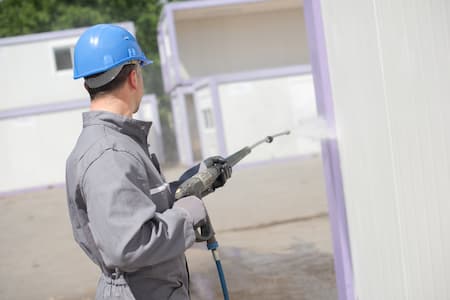Construction property washing tips
Construction sites are often dirty places, and there are many things that need to be cleaned up before workers return home. These can cause problems with the health of your family as well as damage your property. Removing this dirt will help you avoid property damage and cleanliness issues in your home. Here are five tips for cleaning up construction sites safely and effectively.
Cleaning up after a job site is not as easy as you think
✅ Wear protective gear
If you work at a construction site, you should wear safety equipment such as gloves, boots, goggles, ear protection, and hard hats. These items will protect you from injury and help keep your clothes clean.
✅ Keep your hands clean
Dirt and debris can easily get into your skin through cuts and abrasions. To avoid getting sick, wash your hands frequently with soap and water.
✅ Wash your tools
Tools used at a construction site can become contaminated with dirt and debris. Before using any tools, make sure they are clean by washing them thoroughly with soap and water. Don’t use harsh chemicals or abrasive cleaners.
✅ Dispose of waste properly
Waste left behind at a construction site can cause serious environmental damage. Make sure to dispose of trash properly so that it does not pollute the environment.
The right equipment can save time and money
You can save money and time by purchasing high-quality equipment. A good contractor will provide you with the right tools for the job.
Clean up before leaving- After completing a project, take the time to clean up the area. This includes removing debris, sweeping up loose materials, and picking up nails and other sharp objects. Always use a pressure washer when cleaning concrete and other surfaces that are hard to reach with a hose or mop. Pressure washing will get into corners and crevices where other methods cannot, saving you time and energy. You should also invest in a high-pressure nozzle so you can clean large areas quickly and efficiently.
A pressure washer is also useful for removing dirt from metal surfaces in metal buildings where regular cleaning isn't possible as well as removing grease from metal surfaces before painting or staining them.
Don't forget to wash down the walls before painting
The walls are the main support system for your new home, so it's important to take extra care when painting them. This is a basic step that many people forget. If you don't wash down the walls, they will be sticky and difficult to paint on. If you don't wash down any loose dirt or dust before painting, the paint will be covered in grime and will have to be sanded away later. This can lead to problems when you try to paint over it later. Before painting, wash down all surfaces with a weak solution of household bleach and water. The bleach will kill any mold or mildew spores that may be on the walls and help prevent paint from sticking to them.
Use waterproof paint when possible
If possible, use water-based paints for interior wall painting projects as these are easier on the environment than oil-based paints because they do not require solvents that pollute air quality and contribute to global warming and this will help prevent water damage to the interior of your home.
Take care of all waste products properly
You should dispose of all waste products properly when you are done painting or staining your walls. Don’t just throw them away in the trash. Make sure you take them to a recycling center or disposal facility. Do not simply throw these materials in the trash; they contain harmful chemicals that can leach into groundwater and contaminate our drinking water supplies in case of an emergency situation like a fire at one of our local schools or businesses. Instead, burn them at a public burning site or send them off-site for recycling or disposal through a local recycling program.
Keeping all the details of building practices and code requirements in mind, ensure you have a plan for renovation and construction, before starting your wash program. With this detailed approach, you will be able to ensure that your property is safe for you and your tenants, throughout the entire cleaning process.
